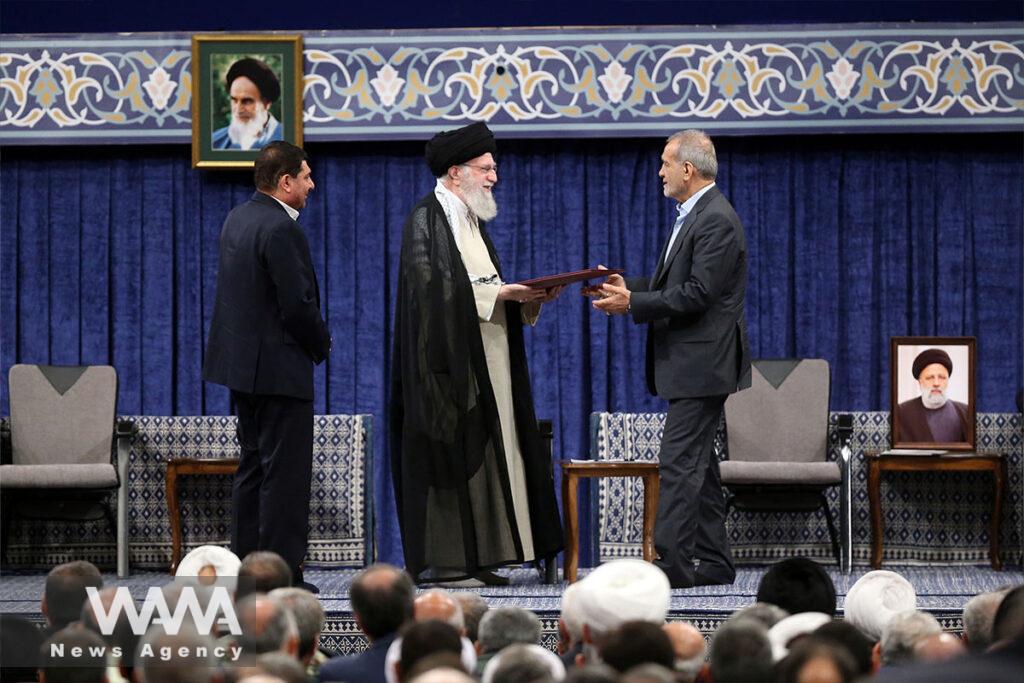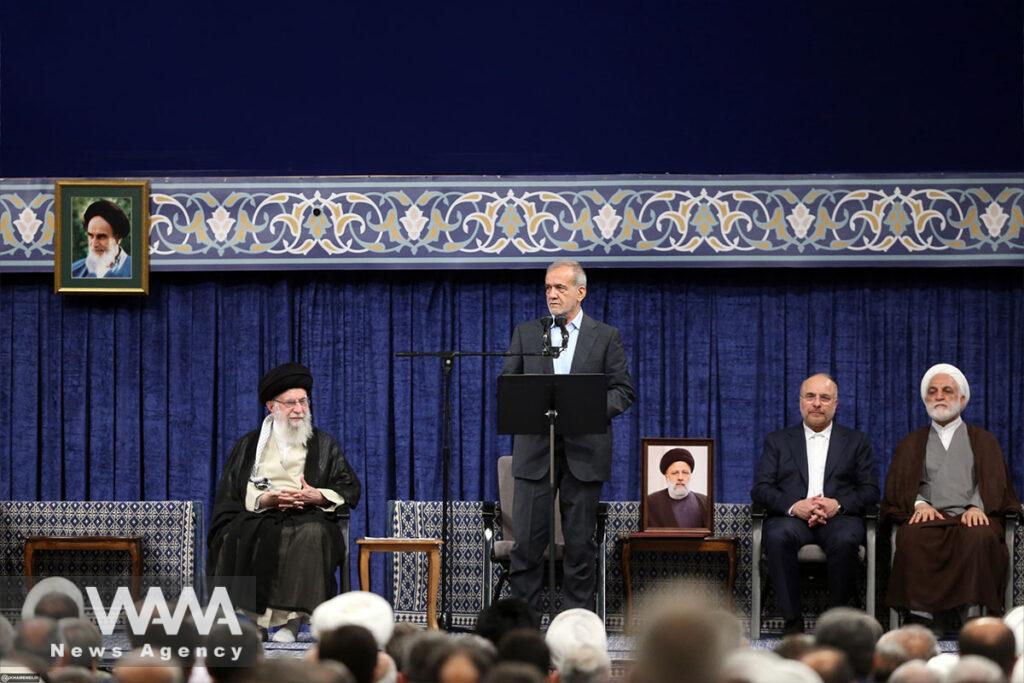Israel: A Major Diplomatic Hurdle for Iran’s New President
WANA (July 28)—Today in Tehran, Masoud Pezeshkian was endorsed as Iran’s new president. During the ceremony, the Supreme Leader, Ayatollah Khamenei, officially signed and presented the presidential decree under the Iranian constitution to President Pezeshkian. This formal act marks the commencement of Pezeshkian’s presidential term.
President Masoud Pezeshkian is scheduled to attend the Islamic Consultative Assembly (Majlis) in two days to take the oath of office. With the formalities of his inauguration concluding, Pezeshkian will soon face the significant responsibility of governing a nation with a population nearing 90 million. His honeymoon period will be short-lived, as he begins the challenging task of managing the country’s affairs starting next week.
The new president of Iran, Masoud Pezeshkian, has expressed a commitment to engaging with all political groups within the country and adopting a conciliatory approach with foreign counterparts. This strategy is anticipated to help ease some of the existing tensions between Iran and the West on various issues, potentially paving the way for improved diplomatic relations and cooperative efforts.
One of the key factors behind Masoud Pezeshkian’s electoral victory was his commitment to improving relations with other countries. Echoing the approach of his predecessor, Hassan Rouhani, Pezeshkian plans to leverage the expertise and experience of Dr. Javad Zarif to achieve this goal. By prioritizing diplomatic engagement and utilizing seasoned professionals, Pezeshkian aims to foster better international relations and address ongoing geopolitical challenges.

The endorsement ceremony of Iran’s new president, Masoud Pezeshkian, by Ayatollah Khamenei – 28 July 2024 -Tehran. Leader office / WANA News Agency
However, many remain sceptical of President Pezeshkian’s ability to make significant positive changes in international relations. Long-standing issues between Iran and the West are seen as persistent problems that even more powerful and influential former presidents were unable to resolve.
Washington’s response to his election has been less than favourable. The U.S. has labelled the recent Iranian elections as neither “free nor fair” and stated that “the election outcome will not significantly influence the U.S. approach to Iran.” A State Department spokesperson mentioned, “Our concerns about Iran’s behaviour remain unchanged.”
Despite scepticism, many still hope that the new president, with his fresh policies and the endorsement of Iran’s Supreme Leader, can reduce tensions and open new economic opportunities for the people.
In recent years, there have been moments when Iran’s relations with the U.S. and the West appeared to be improving. However, unexpected events frequently disrupt progress, slowing or completely derailing negotiations. These setbacks have highlighted the fragility and complexity of diplomatic efforts between Iran and Western nations, making sustained improvement in relations challenging to achieve.
This has become a recurring pattern: whenever there is a chance to improve Iran-West relations and manage tensions, new scenarios and obstacles emerge, particularly from regional and international actors like Tel Aviv.
Israel’s daily military threats against Lebanon, a key player in the regional resistance front, along with rumours about Tehran’s alleged attempts to assassinate former President Trump and disrupt upcoming U.S. elections, and claims of plotting to target Israeli athletes at the Paris 2024 Olympics, all contribute to the notion that Tel Aviv is anxious about the West potentially normalizing relations with Iran under the new president.

The endorsement ceremony of Iran’s new president, Masoud Pezeshkian, by Ayatollah Khamenei – 28 July 2024 -Tehran. Leader office / WANA News Agency
This anxiety persists even if Trump returns to power in Washington, a scenario that is highly undesirable for Netanyahu and his team. This prospect is a nightmare for Israeli officials.
In numerous election debates, recent speeches, and even today during the inauguration ceremony with Iran’s Supreme Leader, Ayatollah Khamenei, Masoud Pezeshkian has explicitly stated his commitment to following the overarching policies and recommendations previously outlined and endorsed by the Supreme Leader.
Iran’s Supreme Leader referred to Israelis as “criminal gangs,” indicating that there are no plans to reduce tensions with Israel.
“The Zionist regime shows the ugliest face of a criminal gang. They (The Zionist regime) is not a government, it is a gang of criminals, murderers and terrorist.”
In a nuanced address, Ayatollah Khamenei highlighted the untrustworthiness of Europeans and Americans while also suggesting that continued dialogue is possible, provided that the West improves its conduct towards Iran.
“We do not have any enmity with them (European countries). No, the reason why I do not mention European countries as a priority is that they have not treated us well for many years, in the case of sanctions, in the case of oil, and in various cases, they behaved badly in fake titles such as human rights and the like. If They do not have this bad behaviour, they are also one of our priorities and one of the cases where communication with them is one of the priorities for us; of course, there are several countries where we will not forget their troubles and their stubborn behaviour.”
The newly elected president, during his campaign, unequivocally stated, “The Islamic Republic has always supported the resistance of the regional people against the illegitimate Zionist regime.” Evidence suggests that Iran’s level of assistance to resistance groups in the region will not diminish in the future.
While the new administration is not seeking a complete and radical shift in its interactions with the United States and the three European countries, it is not opposed to dialogue to resolve mutual disputes.













